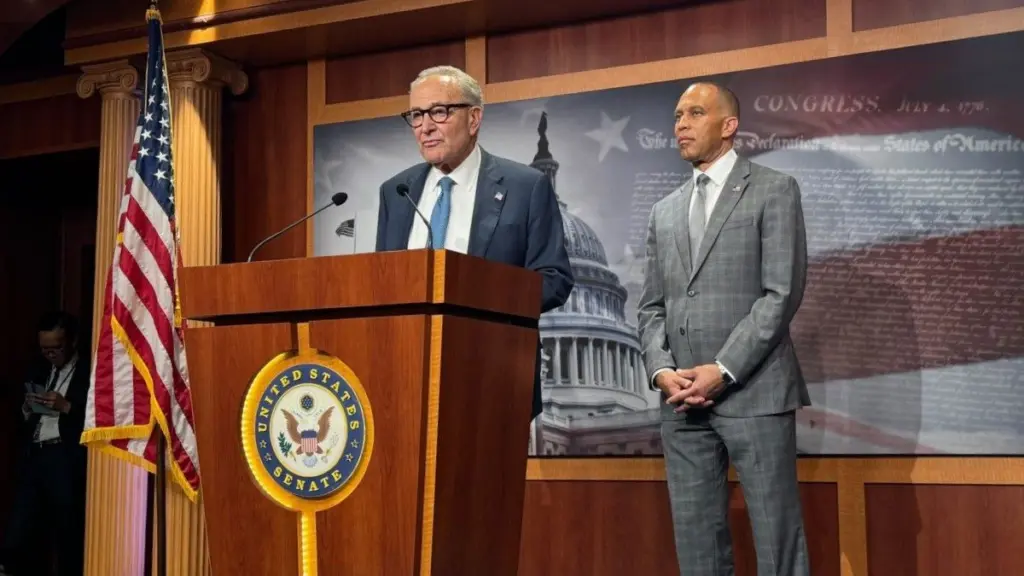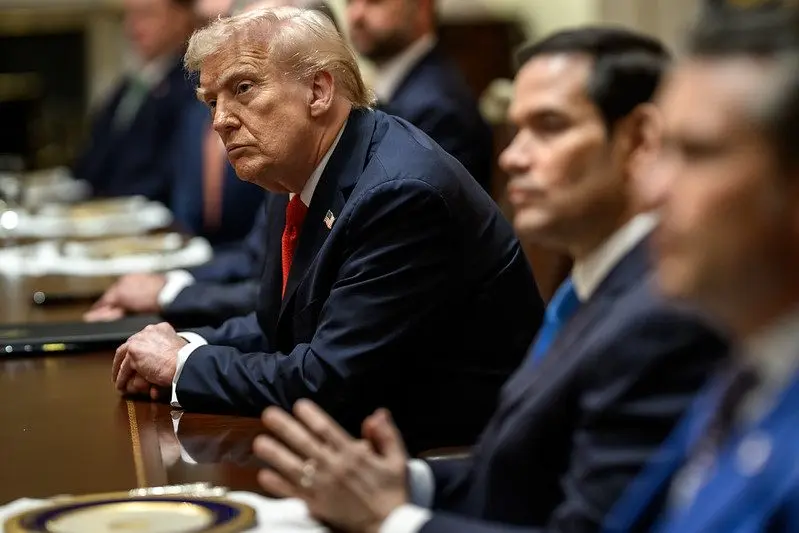WASHINGTON, D.C. – Democratic and Republican lawmakers remained far apart Monday with just over 24 hours until a federal government shutdown begins, after a White House meeting with President Donald Trump and congressional leaders meant to spur negotiations.
Senate Majority Leader John Thune, House Speaker Mike Johnson, Senate Minority Leader Chuck Schumer and House Minority Leader Hakeem Jeffries emerged from the White House just after 4:30 p.m. Eastern still entrenched in their positions.
Democrats are demanding promises to lower rising health care costs, and Republicans are pushing for a “clean” stopgap bill to keep the government running through mid-November.
Schumer said he believed “for the first time the president heard our objections,” but “large differences” remained.
“It is our job as legislative leaders to try and solve this problem, or at least fix the problem, and we focused in the room in particular on the (Affordable Care Act) and its extension,” Schumer, a New York Democrat, told reporters on Capitol Hill a short time later.
Vice President JD Vance, flanked by Thune, Johnson and Office of Management and Budget Director Russ Vought, separately told reporters outside the White House, “We’re headed to a shutdown.”
“If they want to talk about how to fix American health care policy, let’s do it. The speaker would love to do it. The Senate majority leader would love to do it. Let’s work on it together, but let’s do it in the context of an open government that’s providing essential services to the American people,” Vance said.
Government funding runs out at midnight Tuesday. If no compromise is reached, hundreds of thousands of government employees would be furloughed, while many would be required to keep working without pay. States Newsroom published a guide explaining what happens.
Health care premium increases
Democrats point the finger to changes made in the recent tax and spending cuts law — commonly referred to as the “one big beautiful bill” — as the reason for rising health care costs.
The law allows enhanced premium tax credits for those who use health insurance on the government marketplace to expire as previously scheduled, by Democrats in an earlier law, at the end of 2025. Republican lawmakers also cut roughly $1 trillion in Medicaid funding over the next decade to help account for the law’s extended and new tax cuts.
“We’re deadly serious about addressing the Republican-caused health care crisis, because it’s a deadly serious issue for the American people — the largest cut to Medicaid in American history, hospitals, nursing homes and community-based health funding closing right now,” Jeffries, also a New York Democrat, said.
Health insurance companies on the Affordable Care Act marketplace have requested or finalized price increases of at least 20% in 29 states, according to an analysis released Thursday by U.S. Sen. Maria Cantwell, a Washington state Democrat.
All marketplace insurer rate increase requests are publicly available at healthcare.gov.
Schumer also pointed to the Trump administration’s impoundment and GOP lawmakers’ rescissions of federal funds, including those for medical research, foreign aid and public media, as another hard line for Democrats.
“We made the point clear that how could we negotiate a bipartisan agreement and then have the president unilaterally through impoundment, or the Republican Party through rescissions, and the president unilaterally through pocket rescissions, undo it all without any input,” Schumer said.
GOP slams ‘hostage-taking’ in shutdown
Republican leaders accused Democrats of “hostage-taking,” and pointed to a five-year, $50 billion fund for rural hospitals that was tucked at the eleventh hour into the massive tax and spending cuts package to compensate for health care cuts.
Thune raised in his hand the GOP’s temporary funding bill that would keep the government open until Nov. 21 and said he didn’t understand why Democrats are “saying this is some huge partisan thing.”
“This is something we do fairly routinely,” Thune, of South Dakota, said of temporary stopgap funding bills.
“This is purely and simply hostage-taking on behalf of the Democrats,” he added.
Johnson said the House had “done its job” roughly two weeks ago when all Republicans and one Democrat passed the seven-week stopgap funding bill.
“That is the record, and don’t forget it,” the Louisiana Republican said.
Republicans failed to gain enough Democratic votes in the Senate, which they control with 53 seats, to clear the final hurdle of 60 votes to advance legislation. Two Republican senators, Alaska’s Lisa Murkowski and Kentucky’s Rand Paul, also voted against the measure.
Jennifer Shutt and Shauneen Miranda contributed to this story.
This story first appeared on Utah News Dispatch.





